When it comes to finding the publisher of a website, whether your goal is collaboration, sales, or link building, you need to kill two birds with one shot – identify the person behind the website and find out their contact details.
And that’s sometimes challenging.
In this post, I’ll share eight effective methods to find the publisher of a website and uncover some actionable tips on how to get their contact information with Snov.io, even if it’s missing.
Intrigued? Read on.
8 methods how to find publisher of website
There are a variety of tactics you can use to find the needed information about the website publisher. In this chapter, I’ll talk about 8 tried-and-tested methods, starting with the easiest and most effective one.
How to find the publisher of a website:
1. Use Snov.io Email Finder
This method helps you not only identify a publisher of a website in seconds, but you also get their email address, which you’ll add to your list for further email outreach.
You can uncover Snov.io’s email-finding power by using it both as a browser extension and a standalone app. Let me show you how.
Step 1.
Register on Snov.io (it’s free), download the Snov.io Email Finder extension, go to the website you’re interested in, and activate the extension.
Step 2.
As a hands-on example, I sought the publisher of the website bringthedonuts.com, a hub for coaching product managers and leaders, helmed by Ken Norton. After downloading the Snov.io Email Finder, I clicked on the respective extension icon, chose the ‘Prospects’ tab, and immediately fetched the needed information about the founder.
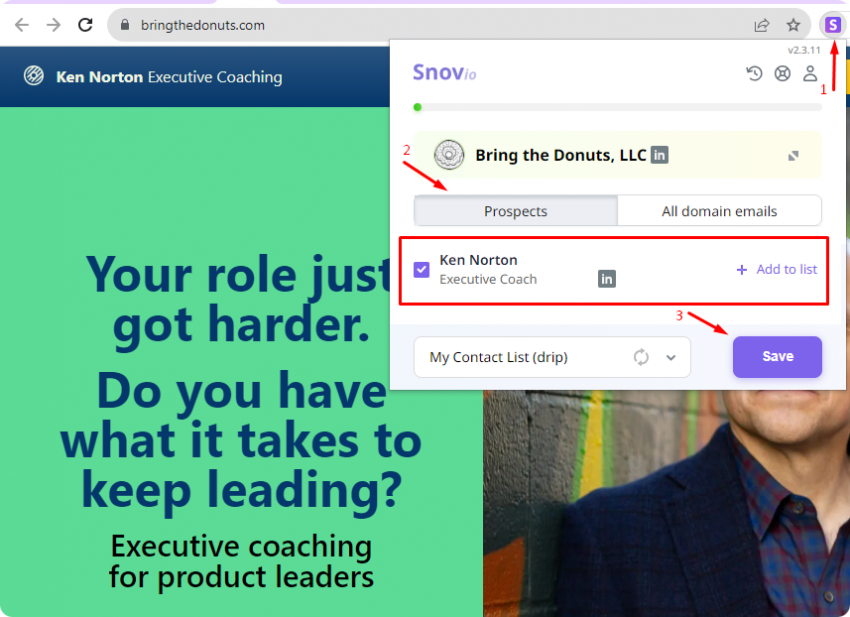
Step 3.
By saving the contact or adding it to the list, I’ve also saved his email address to my Snov.io account. The email address has been automatically verified, so I don’t need to worry whether it’s legit.

Alternative approach
If you’re more of an app person, locate Snov.io ‘Domain Search’ feature. Enter the domain name in the field, and voilà – details about the company and associated email addresses are at your fingertips. Just refine your results by job position. Using my earlier quest as an example, I found Ken Norton amidst the results.

↓

Bonus
The best thing about all this is that Snov.io will cost you nothing at all if you use its forever free Trial plan.
2. Use SEO tools
Though SEO tools are primarily designed to analyze and improve a website’s search engine visibility, they can also provide insights into a website’s ownership and publisher information indirectly.
The magic trick? Backlink analysis. Such analyses showcase websites linking back to the target site. Sometimes, these linking websites might include information about the target site’s publisher.
To demonstrate, I tried to do a backlink analysis using one of the most popular SEO tools, Ahrerfs.
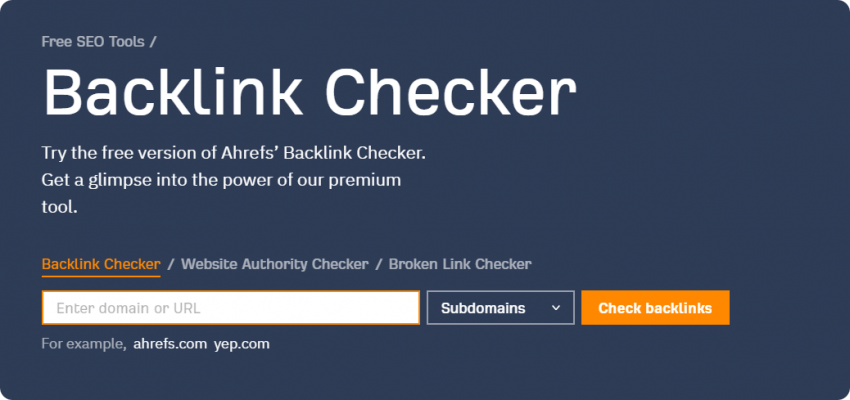
I typed in the marketingsherpa.com domain, and the service immediately provided me with the following results. As you can see, finding the publisher of the website didn’t take long:

Now, to get the contact information of Anne Holland, I can simply use Snov.io Single Email Search, where I type in the first name, the last name, and the domain name:

And look what I saw in 4 seconds😊:

I’ve got the email of the website publisher I was looking for.
Efficient, swift, and pocket-friendly, as both Ahrefs’ Backlink Checker and Snov.io’s trial plan didn’t cost me a dime!
3. Check the company’s social media account
What if a website doesn’t share information about the publisher?
Indeed, not all websites share the publisher’s details on their pages. But most of them do share links to social media accounts, which can often lead you to the information you’re after.
For example, while going through the website of a B2B blogger Seth Godin, I couldn’t find any direct contact information except the fact of his social media presence:
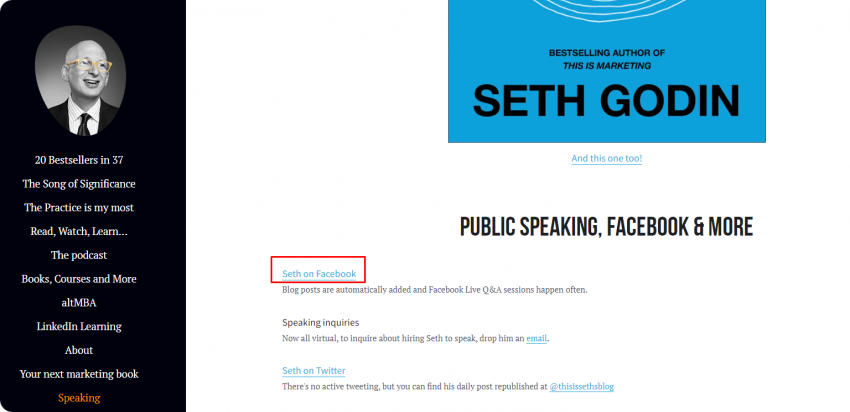
‘What if I check his Facebook page and find something more?’ I thought.
So I did. And after a quick visit, I found his email address.
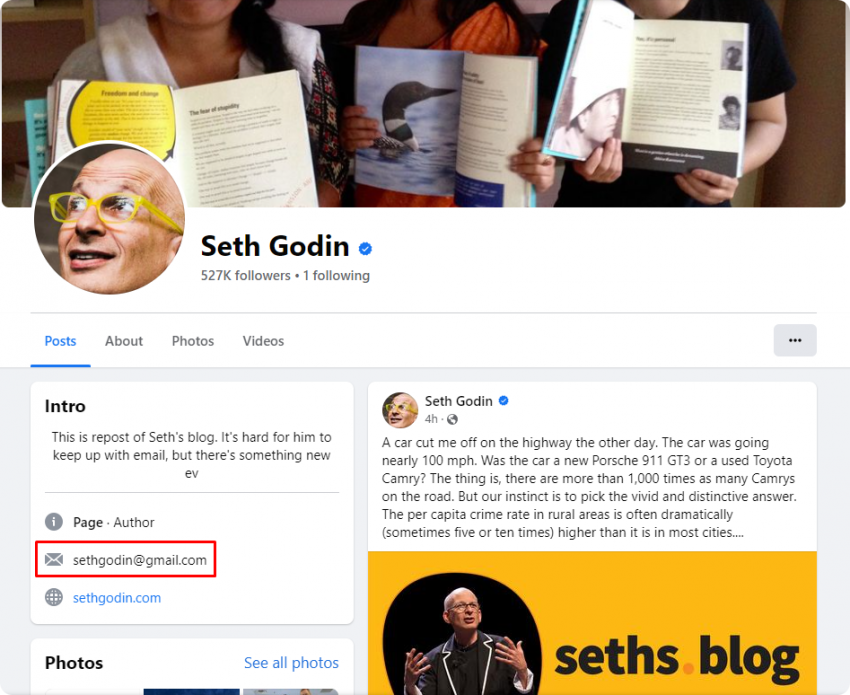
But let’s assume you follow the link to a social media page, but it’s dedicated to the company. That was my case with the Adweek magazine.
When I was on their website, I came across the link to their LinkedIn page, which didn’t immediately disclose any owner information.
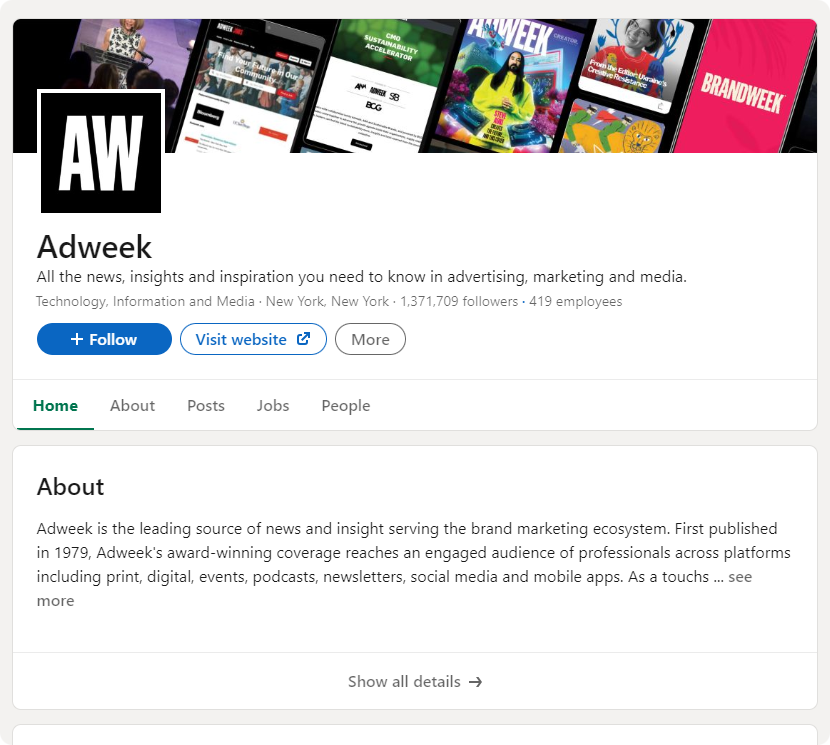
But the page did exist, so I thought the LinkedIn search might bring results. So I simply entered ‘Adweek CEO’ in the search bar and quickly found her – astounding Juliette Morris:
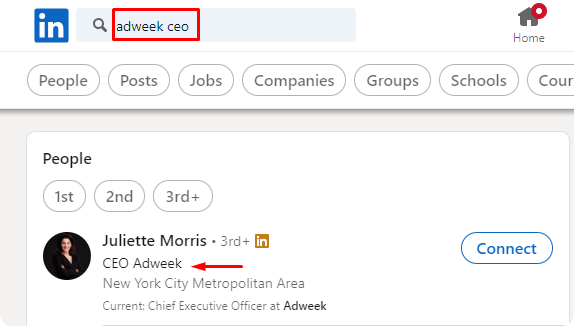
Now I can connect with her by sending a message or an InMail (the latter, yet, isn’t a free option).
But there exists a free option to get in touch with the owner of this magazine. You can again resort to Snov.io for help. Its LI Prospect Finder specializes in looking for emails of LinkedIn members and bringing them to your email list.
Here’s how it works. You go to the website publisher’s LinkedIn account:
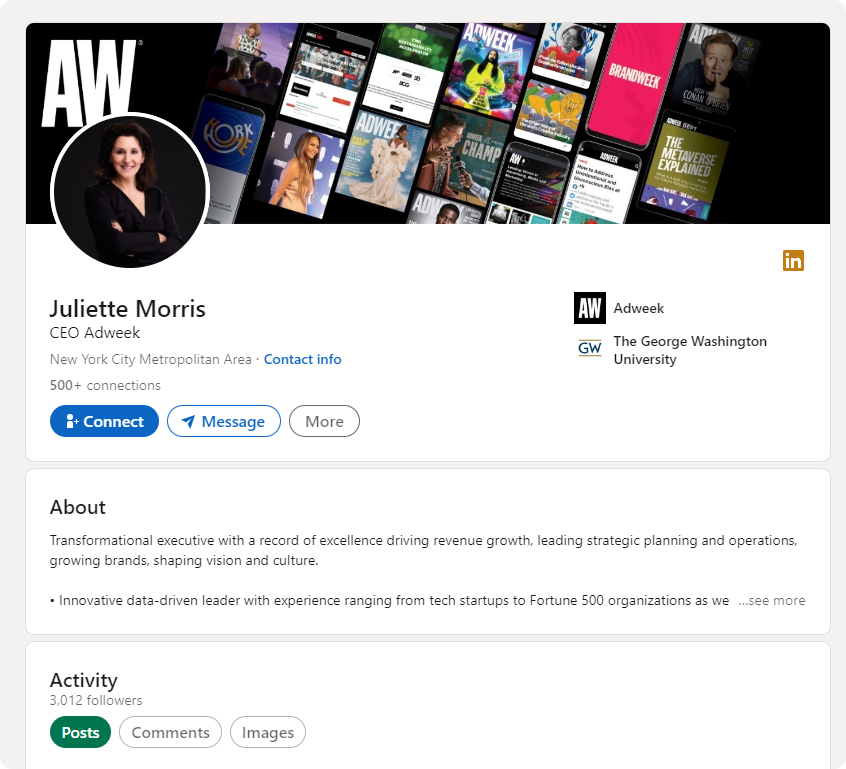
Activate the Snov.io LI Prospect Finder extension. The tool should then provide you with the desired email. Simply save this information:
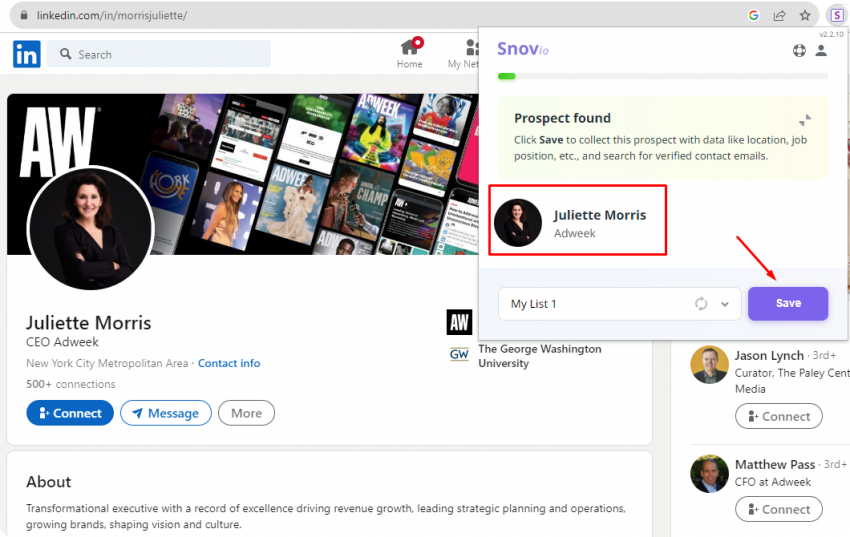
With these steps, I found Ms. Morris’s email and was all set to initiate contact.
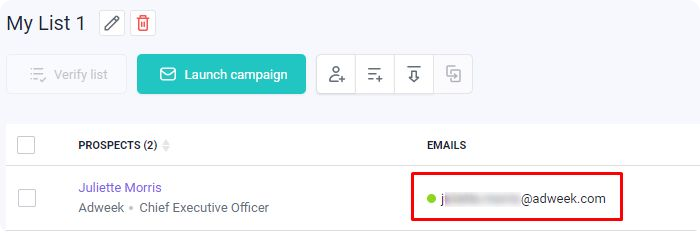
|
With Snov.io, you can do such tricks not only on LinkedIn pages but also on Twitter. For Twitter, however, use another extension – Email Finder – the one we discussed in Method 1. |
4. Subscribe to the website’s email newsletter
Looking for an easy way to uncover information about a publisher of a website without special software?
Here’s a hint: digital newsletters. It’s astonishing how often the simplest approach can be the most effective.
Almost every company/blog page has a subscription form, enticing visitors to join the cohort of their subscribers. Subscribe and wait for a confirmation or welcome email.
Let me share an example.
As soon as I visited Ann Handley blog page (she’s a digital marketing pioneer and a Wall Street Journal best-selling author), I found the Newsletter button, which logically led me straight to the subscription page:

↓
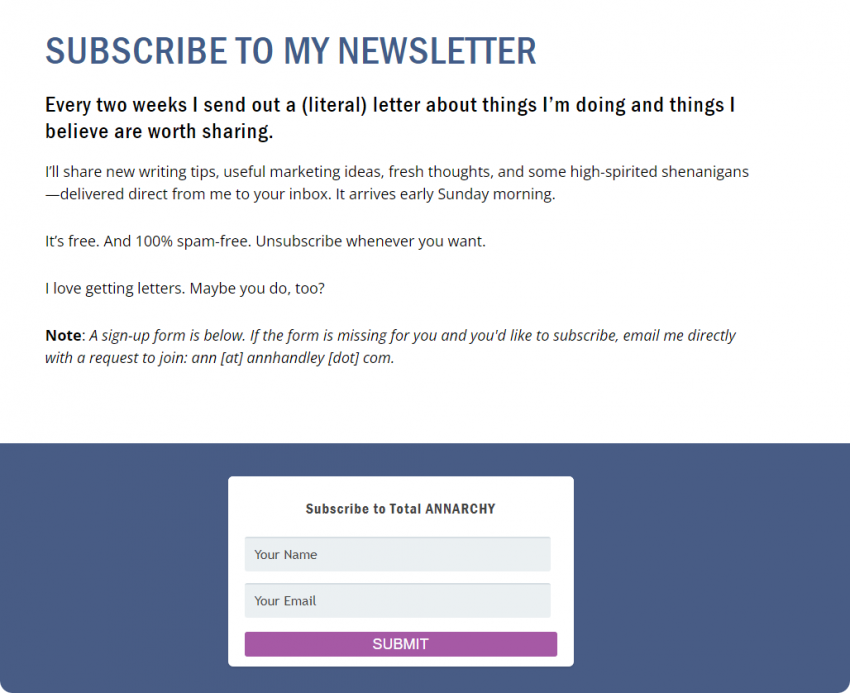
I filled in the subscription form hoping to get the email from the website publisher, which flew to my inbox immediately. As soon as I turned my eyes to the email of the sender, the question ‘who is the publisher of a website?” became clear – her email address was right in front of me:

5. Look at the author bio section
For most WordPress websites and blogs, people usually have a set way of showing who wrote a certain page or post. For example, WordPress blogs normally contain a bio at the end of the post or page that apart from the publication date tells you about the author, though more rarely a publisher.
😭 Where to find a publisher on a website? I need a publisher!
Okay, okay… There is also a hack that might work on a WordPress site (though not always). Enter the name of the website in your browser’s address bar and add the following to the site’s URL: “/?author=1”
For instance, I tried it on my own with Small Business Trends blog and was lucky – this command let me right to the website publisher page, where I got information on how to contact the person in charge:

6. Check Contact Us, About, or Team pages
‘But where to find the publisher of a website if it has nothing to do with WordPress?’, you may ask. The most obvious place to look is the Contact page. What you’ll find there is a contact form, an email address, or other info you can use for your outreach.
For instance, on the webpage of Jeb Blount, one of the world’s most respected thought leaders on sales, I quickly found the Contact Us section, revealing the phone number and social links to contact the guru.

|
Don’t regret if the person behind the email you’ve found on the Contact Us page didn’t appear to be the website publisher. Just ask them “Who is the publisher of a website?”, and they might connect you with the person you’re looking for. |
Apart from this, most websites have the About page, where they might mention the details of the publisher, owner, and more.
For example, surfing through the Women in Business website, I came across the About section, which swiftly brought me to the page with the information about the website publisher – Susan Guneliu – as well as how to contact her:
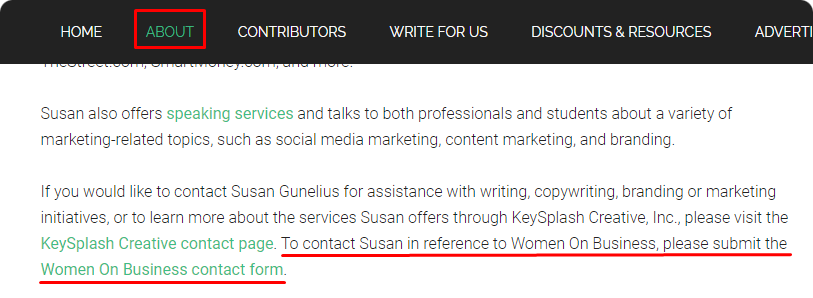
Bigger websites usually have a Team page where you can find info about website owners – publishers, editors, and authors.
The website location of Contact Us, About, or Team pages may differ from website to website. So if you don’t see the respective sections above the page, don’t be lazy to scroll down to the footer 🙂
7. Check out the Copyright notice in the footer
Most websites commonly include a copyright notice with their publisher information in the website’s footer. To find it, scroll down to the bottom of the webpage and look for a copyright notice, often represented by the © symbol followed by the year and the publisher’s name.

Frankly, I would advise you to apply this method for academic purposes, while citing the sources used in your research.
For business purposes that presuppose you don’t just need to cite the publisher but also reach out to them with some offer, pay attention to the recommendation above – peep into the footer of the website to find the information about how to contact the publisher (email address, phone number, or social media links).
|
If you can’t reach out to the website publisher on social media directly, use Snov.io Email Finder or LI Prospect Finder to quickly get their email address. |
8. Use WHOIS lookup
WHOIS lookup is an online service that helps you trace the ownership and tenure of a domain name.
Visit the site and simply type in your target’s domain, leaving out the “http://” part, and see the result.

If your target website publisher doesn’t use WHOIS protection, you might uncover registration and contact information about the person you seek, including their name, phone number, and email address.
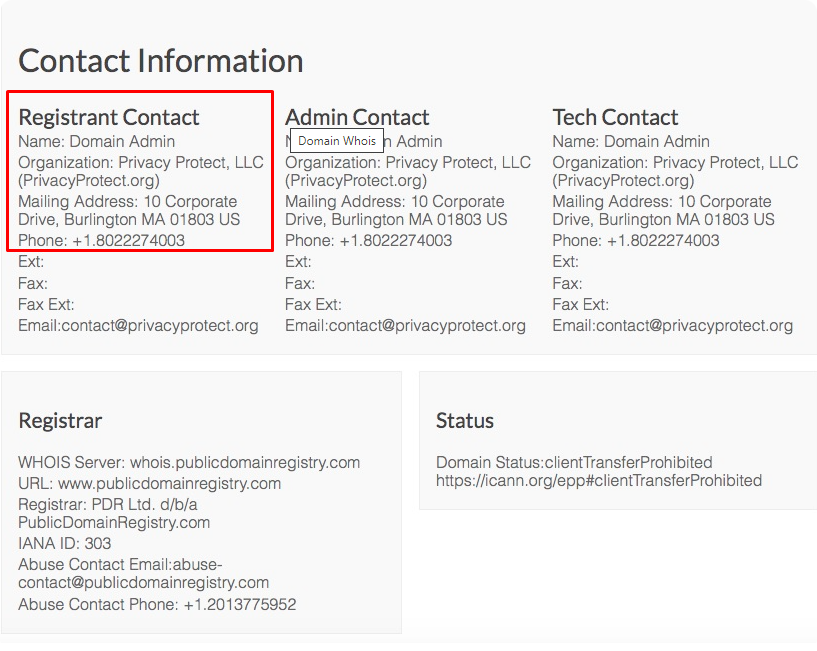
However, very often domain registrants use this protection, meaning the WHOIS information you’ll see won’t be publicly visible. It’ll be protected by proxy:

If this is the case, just remember Method 1. Snov.io Email Finder will help you get the emails associated with the domain. Filter them by the position to find the person in charge.
Why you may be looking for the publisher of a website
If you’ve made your way here, you likely have a purpose in mind. But for those pondering the significance of finding a website’s publisher, here’s a quick rundown:
Reason 1. Sales outreach
Have a stellar product? Reaching out directly to a relevant website owner could be a smart move for your sales outreach.
Reason 2. Partnerships
What if your startup is seeking ways to partner with a business to grow your product or service? By knowing the company’s website, you can quickly reach out to the right person to contact.
Reason 3. Link building
As a blog owner, you should build links with other content creators to grow traffic and increasing your audience. For example, you might need to find a website’s publisher to suggest a topic for their guest post or ask them to link back to your recent blog post.

Link Building Outreach From A To Z With Snov.io
2 March 2023
Reason 4. Podcast participation
If you are a solo entrepreneur and position yourself as an expert in a certain field, it’s high time for you to shine on the related podcasts. And the first thing you’ll probably need to do is to contact the publisher of a website.
Reason 5. Advertising
If you’re scouting for new advertising partners, you’ll face the problem of reaching out to the right person, so you’ll need to look for the website owner information.
Other reasons
Apart from these business-related reasons, some of you might have other reasons for getting in touch with a publisher of a website: for academic purposes, copyright information, or a complaint about legal issues, e.g., the abuse of your intellectual property.
What’s next?
As you see from the post, the highest chances to approach the publisher of a website is through social media or email.
But business people tend to be rather reluctant to answer direct messages on Facebook or Instagram or LinkedIn. As for the email, however, 74% of people choose it as their preferred method of communication, making it the surest way to initiate business conversations.
Above I’ve shared how easily and cost-effectively you can find email addresses of website publishers with Snov.io.
What if I tell you this platform has something more to offer than just finding emails? With Snov.io Email Drip Campaigns, you can automate the way you communicate with website publishers, highly personalize your offers, schedule your email campaigns to the most convenient time, and see how you, once a shy entrepreneur, are confidently conquering the business world.
You have the talent. You just need the tool. Go ahead!







